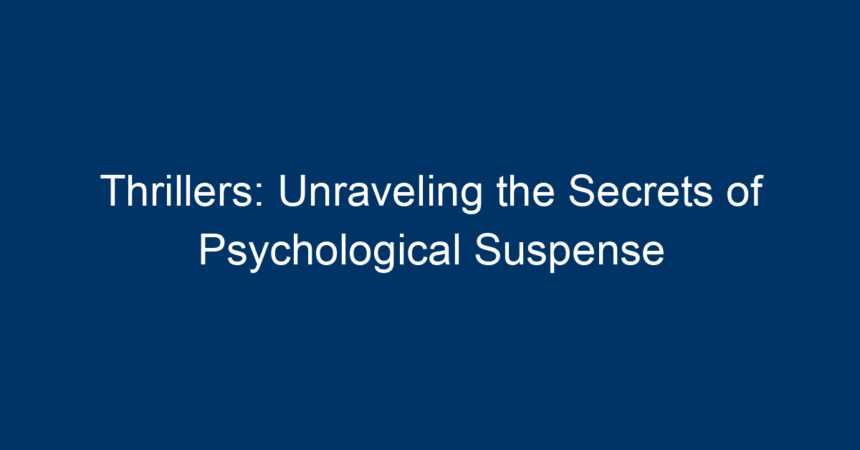Thrillers have captivated audiences for decades, proving to be a cornerstone of both literature and cinema. But what truly lies at the heart of psychological suspense? This genre goes beyond mere scares; it delves deep into the human psyche, exposing fears, motives, and secrets. In this article, we’ll explore the intricacies of thrillers, the elements that make them tick, and why they continue to resonate in popular culture. So, buckle up as we unravel the secrets of psychological suspense!
What Are Thrillers?
At their core, thrillers are narratives designed to draw readers or viewers into a gripping experience filled with tension and excitement. Often characterized by rapid pacing, plot twists, and a sense of urgency, these stories keep audiences on the edge of their seats. They can merge various themes, from crime to horror, but one key element remains consistent: the psychological underpinning.
The Roots of Psychological Suspense
The psychological aspect of thrillers distinguishes them from other genres. Unlike straightforward crime dramas or horror stories that may rely on external threats, psychological thrillers explore the inner workings of the mind. They pose intriguing questions: What drives someone to commit a crime? What are the psychological effects of trauma?
Classic examples include Alfred Hitchcock’s films, such as Psycho and Rear Window. These masterpieces utilize suspense not just through shocking events but also by presenting characters with complex motivations and moral dilemmas.
Key Elements of Psychological Thrillers
To fully appreciate what makes thrillers compelling, let’s delve into their key elements:
1. Complex Characters
In thrillers, characters often navigate ambiguous moral landscapes. Protagonists and antagonists may appear flawed or morally gray, making audiences question their motivations. A well-crafted character can evoke sympathy and fear simultaneously, heightening the psychological tension.
Example:
In Gone Girl by Gillian Flynn, both Nick and Amy Dunne are portrayed with depth, making readers grapple with their loyalties throughout the story.
2. Unpredictable Plots
Thrillers thrive on plot twists and surprising developments. The unpredictable nature of these narratives keeps readers guessing. Just when you think you’ve figured it out, a new revelation turns everything upside down.
Example:
In Shutter Island, the unfolding mystery is not just about uncovering a crime; it’s a labyrinth of psychological complexities that leads to a shocking conclusion.
3. Atmosphere and Setting
Thrillers often emphasize mood, utilizing settings that evoke unease. Dark alleys, isolated cabins, and oppressive environments amplify the tension and serve as extensions of the inner turmoil faced by characters.
Example:
The claustrophobic setting of The Silence of the Lambs intensifies the psychological cat-and-mouse game between Clarice Starling and Hannibal Lecter.
4. Themes of Fear and Paranoia
The themes of fear, paranoia, and obsession are predominant in psychological thrillers. By tapping into universal anxieties—such as the fear of the unknown or the betrayal of trust—these narratives create an emotionally charged experience.
The Appeal of Thrillers
Why do we love thrillers? Several factors contribute to our fascination:
1. Catharsis and Escapism
Engaging with thrillers allows audiences to confront their fears in a safe space. The emotional rollercoaster of a gripping thriller can provide a cathartic release as characters navigate danger and uncertainty.
2. Intellectual Engagement
Thrillers often require active participation from the audience. Solving a mystery or piecing together clues engages our intellect, making the experience stimulating and rewarding.
3. Exploration of Dark Themes
Psychological thrillers delve into what lies beneath the surface, exploring themes of trauma, betrayal, and moral ambiguity. This exploration can be both chilling and thought-provoking, offering insights into human behavior.
The Evolution of Thrillers in Modern Media
As society evolves, so do the narratives that thrill us. Contemporary thrillers often reflect modern anxieties, such as technology and identity. The rise of streaming platforms has also transformed how we experience thrillers, making binge-watching a common way to engage in this genre.
1. Technology and Surveillance
Modern thrillers frequently incorporate themes of technology, surveillance, and digital manipulation. Black Mirror and films like The Net illustrate how technology can create tension and paranoia, challenging our notions of privacy and safety.
2. Diverse Perspectives
Today’s thrillers often include diverse voices and perspectives, enriching the narratives and making them more relatable. Stories that reflect various cultural backgrounds and experiences resonate with broader audiences.
How to Write a Gripping Thriller
If you’re an aspiring writer eager to craft your own thriller, here are some actionable insights to consider:
1. Develop Multi-Dimensional Characters
Ensure your characters have depth. Consider their backgrounds, motivations, and flaws. Complex characters enhance the psychological tension and keep readers invested.
2. Keep the Pace Fast and Engaging
Thrillers benefit from a brisk pace. Utilize short chapters, cliffhangers, and shifting perspectives to maintain momentum and keep readers hooked.
3. Employ Unpredictable Twists
Craft twists that genuinely surprise your readers. Foreshadowing can be an effective tool, but make sure to do it subtly. The goal is to create a sense of awe when the surprise is revealed.
4. Create a Tense Atmosphere
Utilize descriptive language to set the mood. The right ambiance can evoke emotions and amplify the psychological elements of your story.
5. Explore Themes Thoughtfully
Incorporate themes that provoke thought and resonate emotionally. Delve into what motivates your characters and examine the nature of fear, trust, and morality.
Conclusion: Unraveling the Secrets of Thrillers
Psychological thrillers are a complex tapestry woven with suspense, intricately designed characters, and unforeseen plot twists. Their enduring appeal lies in their ability to evoke visceral emotions while exploring the intricacies of human behavior. Whether through literature or film, thrillers challenge us to confront our darkest fears and engage our intellect.
For fans and aspiring writers alike, diving into this genre provides an exhilarating journey. By understanding the elements that characterize thrillers, you can not only appreciate them more but also find inspiration to craft your own stories. Embrace the suspense, explore the depths of human psychology, and unravel the secrets that make thrillers an enthralling experience!




